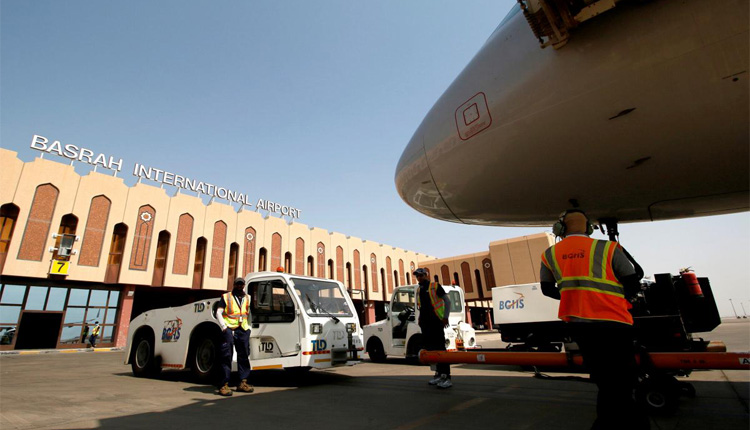Basra airport was attacked with rockets on Saturday after another night of protests against Iraq’s political elite, during which demonstrators set fire to the Iranian consulate and briefly took oilfield workers hostage.
Iraq’s second city has been rocked by five days of demonstrations, in which government buildings have been ransacked and set alight by protesters angry over political corruption. Protests first erupted in July over poor government services, but intensified this week.
Organizers of the demonstrations said they would pause on Saturday, but there was still a heavy presence of security forces in the city of more than 2 million people as a curfew resumed at 4 p.m. (1300 GMT), with streets emptying out.
Security sources said three Katyusha rockets fired by unknown assailants had hit the perimeter of the airport, although no damage or casualties had been reported. The U.S. consulate is adjacent to the airport.
An airport official said there had been no disruption to operations.
The attack came shortly after the overnight curfew was lifted and hours after the reopening of Iraq’s main seaport, Umm Qasr, which protesters had paralyzed by blocking its entrance.
On Friday, protesters broke into the Iranian consulate, shouting condemnation of what many see as Iran’s sway over Iraq’s affairs, and set it alight. Iran and Iraq both strongly condemned the move, raising fears of possible retribution.
Security sources said three Katyusha rockets fired by unknown assailants had hit the perimeter of the airport, although no damage or casualties had been reported. The U.S. consulate is adjacent to the airport.
An airport official said there had been no disruption to operations.
The attack came shortly after the overnight curfew was lifted and hours after the reopening of Iraq’s main seaport, Umm Qasr, which protesters had paralyzed by blocking its entrance.
On Friday, protesters broke into the Iranian consulate, shouting condemnation of what many see as Iran’s sway over Iraq’s affairs, and set it alight. Iran and Iraq both strongly condemned the move, raising fears of possible retribution.
Another group of protesters entered a water treatment facility linked to the West Qurna 2 oilfield and held two workers hostage for about an hour before leaving peacefully. Production was not disrupted, a manager at the oilfield said.
POLITICAL INFIGHTING
Residents in Basra say they have been driven onto the streets by corruption and misrule that have allowed infrastructure to collapse, leaving no power or safe drinking water.
The crisis comes at a time when politicians still have not agreed on a government after an inconclusive election in May. The new parliament met for the first time on Monday, but failed to elect a speaker, much less name a prime minister.
Parliament convened an emergency session on Saturday to discuss the crisis in Basra and the current prime minister, Haider al-Abadi, warned that the situation could descend into armed conflict.
“Politics should be separated from security and services,” he said.
Nevertheless, leaders of all the major blocs vying to form a ruling coalition criticized one another’s roles in the crisis.
Following the session, the two largest electoral blocs, the Conquest Coalition and Sairoun, called on Abadi to resign.
Sairoun is led by Moqtada al-Sadr, a populist Shi’ite cleric whose electoral bloc came first in May’s election, who has allied himself with Abadi.
Their alliance is competing to form a new government against the Conquest Coalition, backed by Abadi’s predecessor Nuri al-Maliki and the leader of an Iran-backed Shi’ite armed group, Hadi al-Amiri. Amiri first called for Abadi to resign on Friday.
Three protesters died on Friday and 48 more were wounded, 26 of whom were shot, sources said, while two members of the security force were wounded.
At least 13 protesters have died, some in clashes with security forces, since Monday.
At a cabinet meeting, ministers agreed to send a delegation to Basra, and Abadi said he had ordered an investigation into the security forces “for not fulfilling their duties” in protecting government buildings and the Iranian consulate.
The heads of Basra Operations Command and the Basra Police were both sacked on Saturday.
source: Reuters
